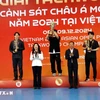Thirteen-year-old Duc Doan from Son Dong Village in Hoai Duc district on the outskirts of Hanoi happily goes to school every Sunday morning.
He is not catching up on any of his usual school subjects, but joining other children in the village at the commune’s primary school to learn chu Nho (Han Chinese script).
Very few Vietnamese know how to read or write in Nho script, which was the official written language in Vietnam until French domination in the 19th century. Nho literally means script of Confucian scholars, and was borrowed from the Chinese. More difficult to learn than the modern romanised Vietnamese, the use of Nho died out in Vietnam a long time ago, and now remains largely the pursuit of the most studious of scholars.
That is until school guard Nghiem Quoc Dat decided to open his own Nho script classes five years ago, to teach the script and Confucianism to children in his family clan. His initial aim was to help the future generations preserve the family’s traditional fondness of learning.
"My family had long been known for having many Confucian scholars," says Dat. "This village also had many laureates during feudal times when centuries-old examination systems were used to recruit talented people to become mandarins."
Dat says he was sad to see fewer and fewer people in his village being able to read or write in the ancient script nor understand the philosophy of Confucius, which dominated society during the older days.
The nation’s ancient scripts still play an important role in Son Dong Village where many people make a livelihood from the traditional handicraft of making hoanh phi cau doi (horizontal lacquered banners and parallel sentences written in Han characters). The parallel sentences can often be seen in traditional houses in Vietnam .
But it’s not only nostalgia for bygone days that motivated Dat, a poor school guard, in his late 60s, to become a ‘voluntary’ teacher while he and his family were still struggling to make ends meet.
"This isn’t only about learning an ancient language," he says.
Dat says that 60 per cent of the Vietnamese spoken language is made up of Han-Vietnamese (Vietnamese words derived from Chinese), so learning the Han scripts also helps people to more thoroughly understand Vietnamese.
Dat’s goodwill and strong determination helped him overcome all the difficulties.
Dat named his class Sao Khue (Khue Star), the symbol of literature, intelligence and knowledge in Vietnamese culture.
Another huge challenge for Dat was his total lack of any teaching experience. Undaunted, he carefully prepared his lessons, finding that the old way of teaching used by scholars in the past was no longer suitable for the children "of the internet age".
He made his lessons interesting and relaxed. He included many poems, puzzles and stories which made it easier for the students to remember and understand complicated Han characters and all their meanings.
His simple but methodical and engaging way of teaching resulted in the children becoming absorbed in learning the old scripts, often said to be difficult to understand, even for adults.
Students at the Sao Khue class haven’t confined their studies to learning how to write elegantly in an ancient script. They are also learning how to differentiate between right and wrong, based on the moral philosophy of Confucian ethics.
The lessons can either be as simple as showing students the value of being respectful and grateful to their parents and grandparents and patriotic to the motherland, or more complicated, such as examining more academic ideas like the concept of ying and yang .
Starting out with a small group of children, the class has now expanded to include all types of students, including older villagers, university students, veteran soldiers and monks./.
He is not catching up on any of his usual school subjects, but joining other children in the village at the commune’s primary school to learn chu Nho (Han Chinese script).
Very few Vietnamese know how to read or write in Nho script, which was the official written language in Vietnam until French domination in the 19th century. Nho literally means script of Confucian scholars, and was borrowed from the Chinese. More difficult to learn than the modern romanised Vietnamese, the use of Nho died out in Vietnam a long time ago, and now remains largely the pursuit of the most studious of scholars.
That is until school guard Nghiem Quoc Dat decided to open his own Nho script classes five years ago, to teach the script and Confucianism to children in his family clan. His initial aim was to help the future generations preserve the family’s traditional fondness of learning.
"My family had long been known for having many Confucian scholars," says Dat. "This village also had many laureates during feudal times when centuries-old examination systems were used to recruit talented people to become mandarins."
Dat says he was sad to see fewer and fewer people in his village being able to read or write in the ancient script nor understand the philosophy of Confucius, which dominated society during the older days.
The nation’s ancient scripts still play an important role in Son Dong Village where many people make a livelihood from the traditional handicraft of making hoanh phi cau doi (horizontal lacquered banners and parallel sentences written in Han characters). The parallel sentences can often be seen in traditional houses in Vietnam .
But it’s not only nostalgia for bygone days that motivated Dat, a poor school guard, in his late 60s, to become a ‘voluntary’ teacher while he and his family were still struggling to make ends meet.
"This isn’t only about learning an ancient language," he says.
Dat says that 60 per cent of the Vietnamese spoken language is made up of Han-Vietnamese (Vietnamese words derived from Chinese), so learning the Han scripts also helps people to more thoroughly understand Vietnamese.
Dat’s goodwill and strong determination helped him overcome all the difficulties.
Dat named his class Sao Khue (Khue Star), the symbol of literature, intelligence and knowledge in Vietnamese culture.
Another huge challenge for Dat was his total lack of any teaching experience. Undaunted, he carefully prepared his lessons, finding that the old way of teaching used by scholars in the past was no longer suitable for the children "of the internet age".
He made his lessons interesting and relaxed. He included many poems, puzzles and stories which made it easier for the students to remember and understand complicated Han characters and all their meanings.
His simple but methodical and engaging way of teaching resulted in the children becoming absorbed in learning the old scripts, often said to be difficult to understand, even for adults.
Students at the Sao Khue class haven’t confined their studies to learning how to write elegantly in an ancient script. They are also learning how to differentiate between right and wrong, based on the moral philosophy of Confucian ethics.
The lessons can either be as simple as showing students the value of being respectful and grateful to their parents and grandparents and patriotic to the motherland, or more complicated, such as examining more academic ideas like the concept of ying and yang .
Starting out with a small group of children, the class has now expanded to include all types of students, including older villagers, university students, veteran soldiers and monks./.



















